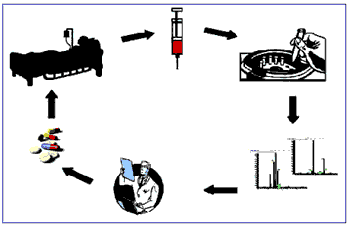| 2006 |

|
YEAR BOOK |
Dublin City University
|
Bio-analytical research at DCU towards improved patient monitoring for cancer therapy
|

The biotechnology industry is now developing better more targeted drugs, some-times termed 'magic bullets'. However, to make use of these drugs we must know what the correct combinations are, what levels are required for effect and how best to exploit old and new drug regimes. Even though Irish patients are treated with the latest drugs biotechnology can provide, individualised patient dosage is currently non-existent. This unique collaboration between Drs Gillian McMahon (School of Chemical Sciences), Robert O'Connor (National Institute of Cellular Biotechnology) and Fiona Regan (National Centre for Sensor Research) has so far led to a number of fast, sensitive and combination methods to be developed. These bioanalytical assays are based on separation techniques such as liquid chromatography and capillary electrophoresis and detection technologies including tandem mass spectrometry.
The overall research objective is to obtain maximum information from minimum sample amounts. We need to provide fast turnaround of results to clinicians to indicate potential need for dose modification during continued treatment cycles. The fruits of this research will enhance patient treatment and promote Ireland's overall participation in international biotech research.
For further information contact:
Dr Gillian Mc Mahon
E-mail: [email protected] or
Dr Fiona Regan
E-mail: [email protected]